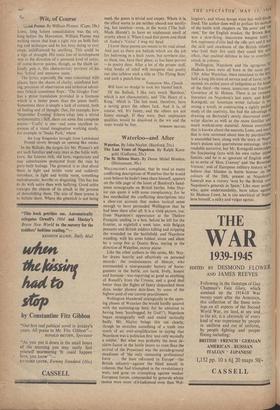Wit, of Course
_ Poems. By William Plomer. (Cape, 18s.) LONG, long before consolidation was the cry, long before the Movement, William Plomer was writing verses that kept a tight rein on both feel- ing and technique and he has been doing so ever since, uninfluenced by anything. This could be a sign of strength. His main line of development was in the direction of a personal kind of satire, of comic-horror poems, though, as the blurb un- kindly puts it, this characteristic territory of his has 'lyrical and sensuous oases.'
The lyrics, especially the ones concerned with places, have the charm of clarity, uninflated feel- ing, precision of observation and technical adroit- ness (which sometimes flops: 'The Gingko Tree' has a prose translation provided in a footnote which is a better poem than the poem itself). Sometimes there is simply a lack of content, both of feeling and of thought. (See, for example, how 'September Evening' fritters away into a trivial sentimentality.) Still, there are some fine complete poems—`Corfu' is one—and some excellent in- stances of a visual imagination working nicely, for example in 'Snake Park,' where the long Ringsnake brought from Lembuland Poured slowly through an opening like smoke. In the Ballads, the targets for Mr. Plomer's wit are such familiar and easy ones as the futile well- born, the fatuous rich, old tarts, vegetarians and tiny suburbanites protected from the rain by jerry-built feelings. The gimmick is to chat about them in light and brittle verse and suddenly introduce, in light and brittle verse, something melodramatic, horrific or disgusting. This has less to do with satire than with bullying. Good satire enlarges the objects of its attack in the process of demolishing them. The aim of these poems is to belittle them. Where the gimmick is not being
used, the poem is trivial and empty. Where it is, the effect seems to me neither absurd nor terrify- ing, but tasteless—even, at the worst (`The Self- Made Blonde'), to have an unpleasant smell of cruelty about it. When I read that poem and think of Auden's `Victor' I wag my head.
I know these poems are meant to be read aloud. And just as there are ballads which are the job for bellowing in a back room, but nowhere else, so these, too, have their place, as has been proved —in poetry dens. After a lot of the proper stuff, what honks of relief will recognise that poetry can also achieve such a title as 'The Flying Bum' and such a punch-line as Tomorrow Mrs. Clunch Will have no drudge to cook her blasted lunch.
Of the Ballads, I like very much 'Bamboo,' which is not characteristic, and The Heart of a King,' which is. The last must, therefore, have a saving grace the others lack. And it is. of course, wit. It's funny, and the others are not funny enough. If they were, their unpleasant qualities would be dissolved in the wit and the




































 Previous page
Previous page